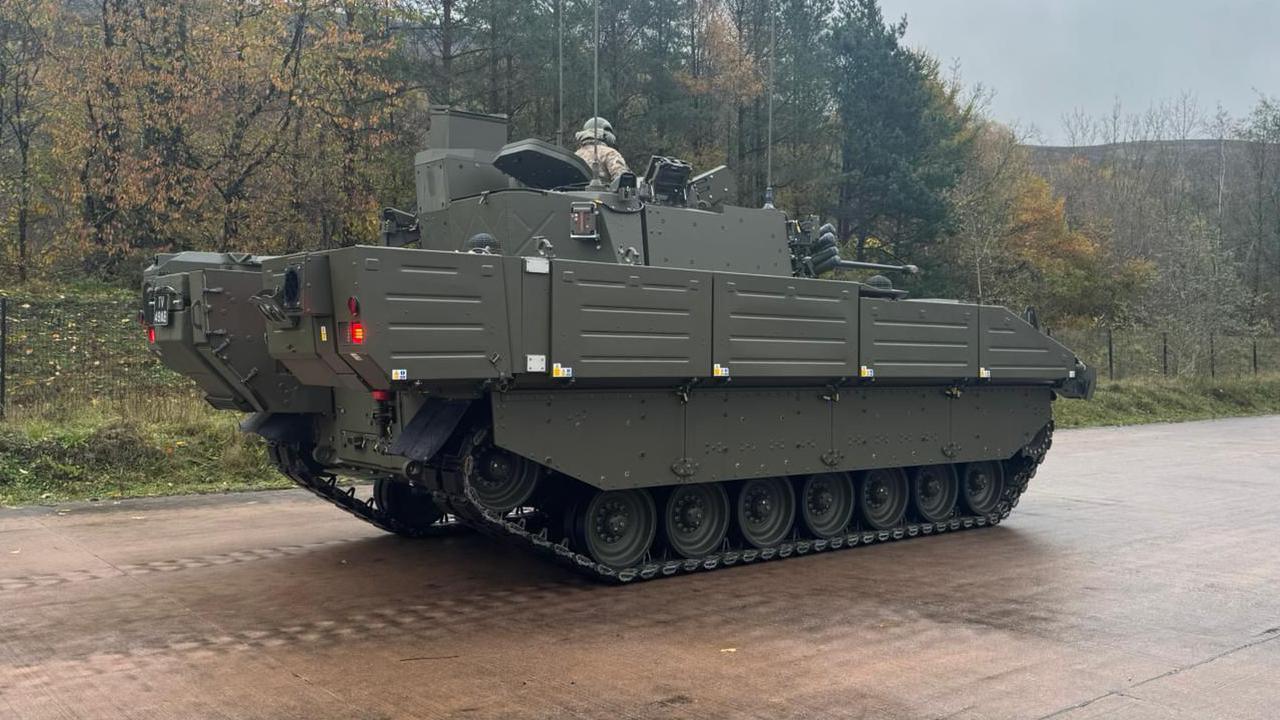Nato interest in 'lethal' Army vehicle, says minister

The Ajax armoured vehicle is "lethal against our adversaries on the battlefield", according to a minister
- Published
The UK government says it is "confident" Nato allies are interested in buying the long-delayed south Wales built Ajax armoured vehicle.
The multi-million pound vehicles, made in Merthyr Tydfil by General Dynamics, were originally due to enter service in 2019.
However the project has been criticised for being poorly managed by the Ministry of Defence and was paused in June 2021 due to concerns over vibration and noise causing hearing loss to those training.
The £6.3bn project has now reached a major milestone and the first vehicles are ready to be deployed on operations by the Army.
Spend new defence billions in Wales, companies say
- Published5 June
Systemic failures found in Army vehicle review
- Published16 June 2023
What is Nato?
- Published20 September
Ajax is a group of six armoured vehicles with reconnaissance and recovery capabilities and all 589 vehicles ordered are expected to be delivered by 2029.
If there are no more orders then the production lines at Merthyr will be empty and the future for the hundreds employed there will be uncertain.
But Defence Minister Luke Pollard said he was "confident" the UK's Nato allies would be interested in the vehicles and that export sales of the "incredible" and "lethal" armoured vehicle will secure the future of the plant.
"It has had problems in the past," he told BBC Wales.
"It was right that trials were paused to look at those problems, but it was also right that the company got on top of them, working with the Army, working with the Ministry of Defence and General Dynamics to fix them.
"We now have an incredible, capable, next generation capability, that's safe for the men and women of our forces to use, but importantly, is lethal against our adversaries if used on the battlefield.
"So it's a really key part of our next generation British Army capabilities. But as a minister, I would not be putting it into service if I had any doubts about its safety."
The history of the project has been described as "deplorable" by the Commons Defence committee and a review of the £6.3bn project in 2023 highlighted "systemic, cultural and institutional problems" at the Ministry of Defence.
General Dynamics employs more than 700 people at its armoured vehicle plant in Merthyr Tydfil, which uses communications equipment developed at Oakdale in Caerphilly county.
Apprentice Charlie Penfold said he was really proud to work on the project.
"It's incredibly prestigious when you work with the military and if you speak to friends or family and you say 'I build armoured vehicles' – there's always a bit of a wow factor.
"I get to come here every day and look at these amazing vehicles."

General Dynamics employs more than 700 people at its Merthyr Tydfil plant
Design engineer Dinda Khairani said General Dynamics played a significant role in the community.
"The company also supports the graduates and apprentices to go to, for example to different local schools to introduce engineering and everything, so I feel like the industry is growing in south Wales so that's a good place to start," he said.
The defence minister said: "I think the workforce here should be incredibly proud of what they have produced, a really capable, lethal platform that will make such a big difference to our armed forces.
"It's because of that incredible capability that I'm confident that our allies are looking at this now and thinking about whether it can enhance their deterrence, their war fighting abilities.
"The UK government, working with the Welsh government, have been promoting this platform to our allies, because I think there's real opportunities to sell this platform to our allies, to export it, to see Ajax vehicles built in Wales, with a British supply chain supporting over 4,000 jobs being used by our allies within Nato and potentially further afield as well."
Earlier this year, the UK government promised to increase defence spending from 2.3% to 2.5% of national income by 2027 to prepare the country for "war-fighting readiness".
Related topics
More top stories
- Published6 November

- Published5 November
